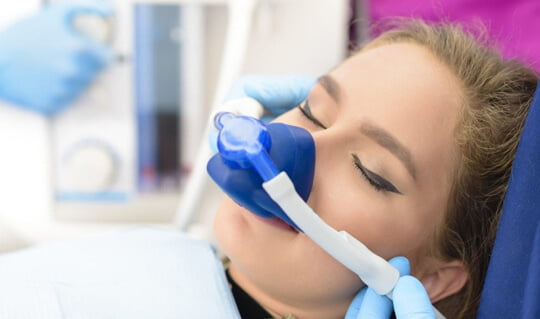It’s normal to feel nervous before major dental surgery, but you shouldn’t let dental anxiety prevent you from receiving the treatment you require. Studies say that up to 20% of individuals avoid going to the dentist due to dental anxiety or fear. Unfortunately, avoiding a problem (such as a cavity) might lead to more serious issues down the road.
We don’t want you to forgo dental care at Carstairs Dental, but we also don’t want you to be afraid of it. Our dentist uses the most advanced sedation techniques to ensure that you are relaxed and comfortable throughout the procedure. In this blog, we are going to discuss how sedation dentistry can be effective in dealing with dental anxiety.
NEW ADULT PATIENT FORM | NEW CHILD PATIENT FORM
What Is Sedation Dentistry?
Although sedation dentistry is commonly referred to as “sleep dentistry,” this term is a little misleading. The use of drugs to help you relax during dental operations is referred to as sedation. While you may be relaxed enough to fall asleep, not all forms of sedation will put you to sleep.
3 Common Methods Of Sedation Dentistry
- Oral Sedation – Oral sedation is a common type of sedation dentistry option. This drug is taken 30-60 minutes before your session in the form of an oral pill. You may become tired and lose the sense of time as a result of the medicine. Because your three-hour visit feels like only a few minutes, you’ll feel less anxious. It’s possible that you’re so calm that you fall asleep, but this isn’t something you’re being forced to do. Oral sedation, unlike laughing gas, does not wear off immediately. This means you’ll need to arrange for a ride home from a friend or family member ahead of time.
- Laughing Gas – A mask is used to distribute nitrous oxide, also known as laughing gas. You merely inhale this colorless, odorless gas and immediately feel relaxed. So, how does this gas help you deal with your dentist’s phobia? This gas slows down your body’s reaction speed when you breathe it in. This produces a calming, blissful sensation. Laughing gas works rapidly, but it also wears off quickly. The effects fade fast after we remove the mask and you cease inhaling the gas. This means you can leave your appointment and drive yourself home.
- General Sedation – For more sophisticated and complicated oral procedures, you may choose general anesthesia. You are completely unconscious during general sedation and sleep the entire treatment.
Therefore, if you suffer from problems related to dental anxiety, there is nothing to worry about anymore.
Know Which Sedation Option Is Perfect For You
When deciding between different types of oral sedation, there are a number of considerations to consider, including:
- The seriousness of dental phobia
- Oral procedures of various types and complexity are required (implant surgery versus filling a cavity)
- The well-being of a person’s overall health
- Availability of a family member or friend to drive you home
Fillings, root canals, periodontal therapy, teeth extractions, implant surgery, wisdom tooth surgery, and emergency dental appointments can all be made more comfortable with sedation dentistry (such as treating cracked or broken teeth).
Whatever sort of sedation dentistry you require, you will be given an anesthetic to keep you comfortable. Anaesthetics inhibit pain while sedation relaxes you.
Don’t let your fear of the dentist keep you from getting the care you need. Our kind and knowledgeable staff can assist you in exploring all of your sedation dentistry choices.
If you are looking for the best sedation treatment options in St. Carstairs, AB, and nearby, book an appointment with Carstairs Dental today!


